#Gracchi brothers
Text
It's the late Roman Republic...
Now put in the tags what you selected and who you THINK it's referring to... Because I sneakily had at least two people in mind when I made each option and when the poll is over I'll reveal who I had in mind for each option
#roman history#ancient rome#roman empire#how often do you think about the roman empire#ancient history#julius caesar#pompey#augustus#pompeius magnus#caesar#the roman empire is my roman empire#lucullus#crassus#Marius#gaius marius#marian reforms#sulla#pompey the great#mark antony#brutus#Hamilton#and peggy#lepidus#marcus agrippa#sextus pompey#octavian#the Gracchi#Gracchi brothers
135 notes
·
View notes
Text
someone at work made a joke about the “how often guys think about the Roman Empire” thing, and asked me what I think about that often. I don’t think she was expecting the answer to be: The Roman Empire.
#but seriously#a lot#though for me it is more likely to be either the roman republic or the far reaches of the empire#the second punic war occupies a lot of my mental attic#as do the gracchi brothers#and how much i hate cicero as a human being#and also roman occupied britain and how frustratingly little we actually know about it#and tacitus’ weirdness about the germans#…i just think about rome a lot is what i am saying
6 notes
·
View notes
Text
The coming ides of March may have instilled in me a spirit of thinking about monarchies
#like the people loved Caesar but the senate hated him because the republic had been rotten for years#Caesar was a dictator (Roman) but making the republic an empire was probably the best thing that could have happened#thing was falling apart from what I understand#Caesar didn’t doom the republic as much as the fuckers standing against the gracchi brothers did#i don’t know if that’s how you spell it but it’s fine#anyways I have feelings about rome and also about the demonisation of all forms of monarchy#feel like I’m gonna get hanged in public for that but like my interest in worldbuilding#has taken me into learning way too much about statecraft#sometimes it might be better to be able to behead a king rather than people blaming eachother for things oligarchs vote into being#anyways if a single person asks I’ll share a fun idea for a government that won’t ever happen#risks of this post getting deleted in future? moderate
5 notes
·
View notes
Text
Someday I will learn not to start essays on the day they are due.
#not an 11:58 essay this time#but it was at 11:11 which is a nice time#the gracchi brothers are so fun
0 notes
Note
I am so sorry. (Do you guys WANT to become America?)
the problem is that the global rise in right wing and extremist politics is being generally underreported and sd as our most fascy party have been diligent in building their image for decades now, on our end (because this is the way our voting system is always doomed to go) we are becoming more and more of a 3 party government (one red one blue one sd) which in the end will if left to its devises become like america without the electoral college
i think the worst thing is that politics has gotten to a place where young people vote for extremist parties because thats the only perceived way for the stalemate to end, the reds and blues refuse to work with each other so government is at a standstill and suddenly we have xenophobes in high places
#looks at the life and politics of the gracchi brothers#i have predictions for the future but i refuse to say them online because itd count as doomposting#and may cause unnecessary anxiety
0 notes
Text
Going for a much more classical bit with the history writing this time
They who have ears, let them hear.
The terminal decay of the Roman Republic began when two brothers, Tiberius and Sempronius Gracchus, would hold the position of Tribune. This was one of the most powerful positions of the Republic and much of the power of the later Emperors began by merging this power in with the other titles they claimed.
The Gracchi looked upon and beheld the empire of the late Republic and could see that it was bringing forth the decay of the Republic's institutions. So they took aim to save the Republic by distributing land from the fallen Empire that was once the Great Carthage, to extend republican institutions and to breathe life into what was becoming an ever more moribund system beyond the oligarchs and the Senate. They were the most famous Populares, a group that believed in the populus of Rome, versus the Senate, which zealously upheld its protocols.
For their attempts to strengthen the Republic they were murdered by the Optimates, who would pass the Senatus Consultum Ultimum to orchestrate their murders. That deed was done and when power began to tilt to those who could and would wield swords, paths did not go the way the Senators who unleashed these deeds hoped for and expected.
#lightdancer comments on history#the decline and fall of the Roman Republic#the rich chose their wealth over the public good and resorted to murder to keep it#in the end they would up losing much of their liberty and the very system that they thought revolved around them#would no longer do so#the brothers gracchi
1 note
·
View note
Photo

Gracchi Brothers
Tiberius Sempronius Gracchus (c. 163-133 BCE) and his younger brother Gaius (c. 154-121 BCE) were tribunes of the plebs in the Roman Republic. Serving in 133 BCE, Tiberius introduced a land reform but was beaten to death after his term. Eleven years later in 122-121 BCE, Gaius reaffirmed his brother's land reform and attempted to curb corruption. He met the same fate as his brother.
Continue reading...
168 notes
·
View notes
Text
Cornelia:
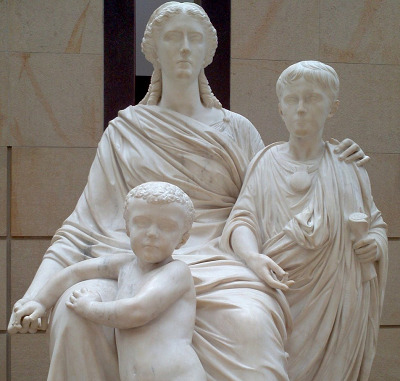
Mother of the Gracchi brothers! Highly intelligent and influential woman who educated her sons and helped shape their political careers. OG Roman MILF
Clodia

Catullus' "Lesbia" Wealthy and highly educated woman who had a talent for poetry (none survives :( ) Cicero hated her and called her "the Medea of the Palatine" (huge W for Clodia) Known for taking many lovers and accused of incest with her own brother (Catullus did not take the breakup well)
Fulvia

The first (real) woman to appear on Roman coinage. Married to Marc Antony (her third husband) and very involved in politics. Cassius Dio wrote "the following year Publius Servilius and Lucius Antonius nominally became consuls, but in reality it was Antonius and Fulvia. She, the mother-in‑law of Octavian and wife of Antony, had no respect for Lepidus because of his slothfulness, and managed affairs herself, so that neither the senate nor the people transacted any business contrary to her pleasure." Plutarch wrote "Fulvia wished to rule a ruler and command a commander and she schooled Antony to obey women." (marc antony is into femdom he's just like me fr fr) Acted as both a political and military leader.
Agrippina the Younger:

One of the most powerful of the Julio-Claudian women and a big influence on behind the scenes politics. Mother of Nero by her first husband. Was exiled for a conspiracy to assassinate her brother Caligula, but later returned. May have poisoned her second husband in order to marry the Emperor Claudius. She was the one to convince Claudius to name Nero heir, instead of Claudius' own son. May have poisoned Claudius in order to make Nero emperor. Ruthless, ambitious, and domineering #girlboss. Fave moment was when Nero engineered a boat designed to sink specifically to assassinate her. She swam to shore, realized her shitty son had tried to kill her (again), and wrote a letter to him letting him know that she had survived a terrible accident by divine fortune.
Messelina
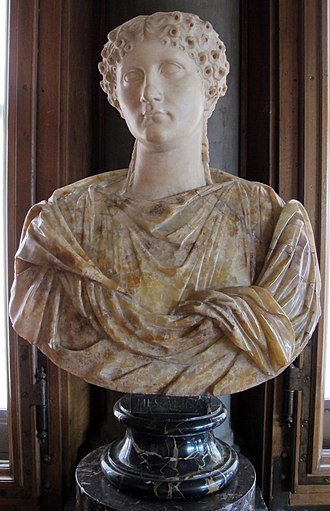
Third wife of Claudius and hugely influential, directly responsible for the execution of several people and tried to get young Nero assassinated so that her own son would have the throne. Hated Agrippina for obvious reasons. Executed for a conspiracy to assassinate Claudius. Pliny wrote a famous (and certainly fake) story of her challenging a famous prostitute to see who could sleep with the most men in one night. (Messalina won at 25)
Julia the Elder:
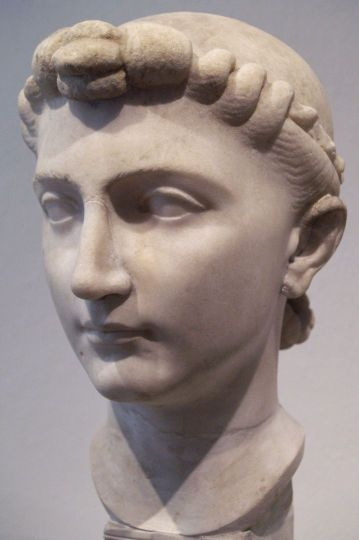
Augustus once famously remarked that he had two difficult daughters: Rome and Julia. Married off by her father several times, all for political reasons. Clashed with her controlling father on many occasions about her spending, behavior, etc. Augustus passed laws making adultery a crime and then had to exile her for adultery (after killing and exiling her lovers) She was popular with the Roman people, who petitioned for her recall from exile, and was known for her kindness, intelligence, and wit. She never returned to Rome, and died in exile.
Livia:
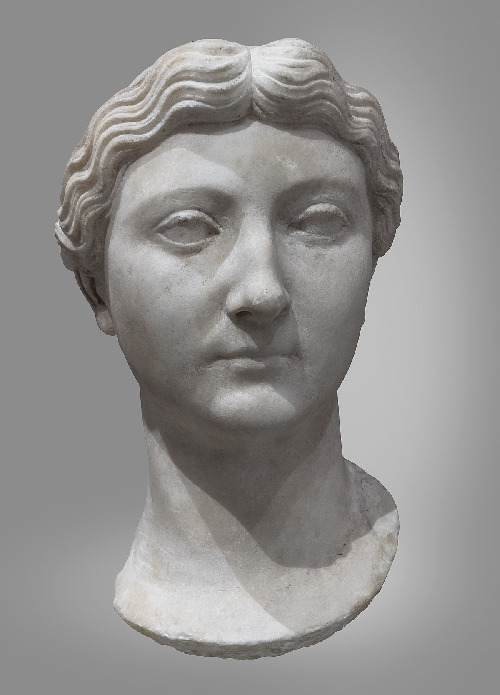
Wife of Augustus and first Roman empress. One of, if not the, the most powerful and influential women in the early Roman Empire. iirc she was the first woman to be deified. Cassius Dio wrote "Livia was destined to hold in her lap even Caesar's power and to dominate him in everything."
Hortensia
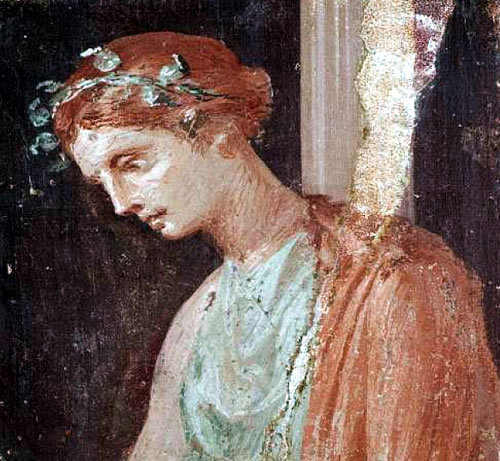
A skilled orator, best known for her public speech given in the forum in protest of a tax put on women to fund the civil war after the assassination of Caesar. She was successful, reducing the number of women taxed down to 400, with new taxes on men being levied to make up the difference. (Using this image of a fresco from Pompeii because there's, surprisingly, no art I can find of her from a google search)
Empress Theodora
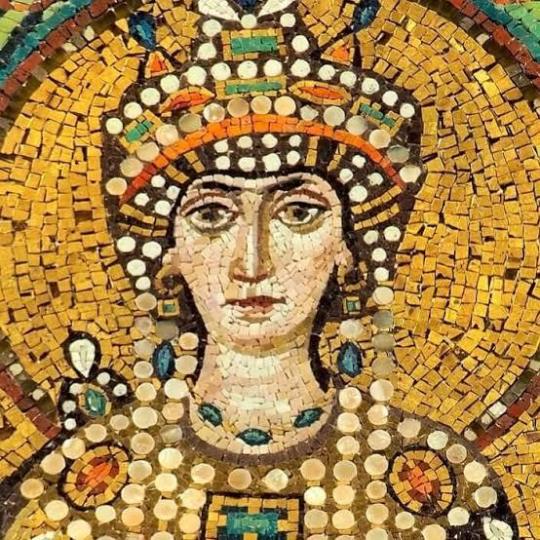
Byzantine empress. She was the daughter of a bear trainer and an actress, and worked as an actress and prostitute in her youth. Married the Emperor Justinian and became his advisor, preforming jobs that were usually only done by the emperor (receiving envoys and corresponding with foreign rulers) and helped pass laws for women's rights.
#i wanted to include terentia and servilia but you can only have a max of ten#so suggestions for 'other' i guess#also wanted to keep it like. completely factual women that we know existed#but shout out to rhea silvia lucretia cloelia tarpeia etc#also wanted an honorable mention to eumachia but again#max ten options
379 notes
·
View notes
Text
People being kept out of the Duplay house compilation
…It was necessary, in order to reach the eminent guest deigning to inhabit this humble little hole of a place, to pass through a long alley flanked with planks stacked there, the owner's stock-in-trade. This alley led to a little yard from seven to eight feet square, likewise full of planks. A little wooden staircase led to a room on the first floor. Prior to ascending it we perceived in the yard the daughter of the carpenter Duplay, the owner of the house. This girl allowed no one to take her place in ministering to Robespierre's needs. As women of this class in those days freely espoused the political ideas then prevalent, and as in her case they were of a most pronounced nature, Danton had surnamed Cornelie Copeau "the Cornelia who is not the mother of the Gracchi." Cornelie seemed to be finishing spreading linen to dry in the yard; in her hand were a pair of striped cotton stockings, in fashion at the time, and which were certainly similar to those we daily saw encasing the legs of Robespierre on his visits to the Convention. Opposite her sat Mother Duplay between a pail and a saladbasket, busily engaged in picking salad herbs. Two men in military garb, standing close to her in a respectful attitude, seemed to be taking part in the duties of the household, obligingly picking herbs, in order to be free to chat more unrestrainedly under the shelter of this familiar occupation. These two men, since famous in their respective positions, were, the one General Danican, who since then, on the 13th Vendemiaire, became impressed with the idea that he was a Royalist, and who perhaps still retains the belief because he is one of England's pensioners; the other was General, later on Marshal, Brune. Freron and I told Cornelie Copeau that we had called to see Robespierre. She began by informing us that he was not in the house, then asked whether he was expecting our visit. Fréron, who was familiar with the premises, advanced towards the staircase, while Mother Duplay shook her head in a negative fashion at her daughter. Both generals, smilingly enjoying what was passing through the two women's minds, told us plainly by their looks that he was at home, and to the women that he was not. Cornelie Copeau, on seeing that Freron, persisting in his purpose, had his foot on the third step, placed herself in front of him, exclaiming: ”Well, then, I will apprise him of your presence," and, tripping upstairs, she again called out, "It’s Fréron and his friend, whose name I do not know." Fréron thereupon said, "It’s Barras and Freron," as if announcing himself, entering the while Robespierre's room, the door of which had been opened by Cornelie Copeau, we following her closely.
Memoirs of Barras: member of the Directorate (1899) page 167-169, regarding a meeting he and Fréron tried to have with Robespierre following their return from Marseilles in March 1794.
Very little time before the cathostraphy where Camille Desmoulins was victim, Joseph Planche, the humanist, the old rhetorics professor at the Bourbon college, who was strongly tied to him, met him in the hooks around Rue de Tournon. Camille was concerned, and told him: ”I’m lost. I went to see Robespierre, and he refused to see me.”
Historie de Robespierre et du coup d’état du 9 thermidor (1865) by Ernest Hame. According to J.M Thompson’s Robespierre (1935), Hamel obtained this anecdote from a friend of a friend of the mentioned Planche.
”…Try to see Maximilien, [said Charlotte Robespierre], you will be content; he was very glad that our younger brother saw you at Melun. On this occasion he spoke with interest of the exercises of your pupils and of the attention you had in entrusting him with presiding over them. I won’t introduce you to him, I would not succeed; I even advise you not to speak to him about me. You will be told he is out, don't believe it, insist on your visit.”
The Robespierre family was housed on rue Saint-Honoré, near the Assomption chapel, the sister and younger brother at the front, the older brother at the back of the courtyard. Gaillard went to Maximilien’s apartment; a young man, looking at him with the most insolent air, said to him, barely having opened the door: “The representative isn’t home…”
“He may not be there for those who come to talk to him about business, but that is not my doing; I will talk to him about his family that I know a lot, you have seen me come out of his sister's apartment who is involved in state affairs no more than I am... Bring my name to the representative, he will receive me, I’m sure of it.”
The fellow did not dare refuse to carry a paper on which Gaillard had taken care to indicate himself in such a way as to be recognized, he immediately came back and gave the visitor his paper saying: “The representative does not know you,” and the door was violently slammed shut!… . The insolence of this brazen man whom Gaillard knew to be the secretary of Robespierre, son of Duplay, to whom the sister attributed the excesses of his brother, the sorrow he felt at losing the hope of saving the judges of Melun and to ensure his personal rest, all these thoughts made him very angry; he calls the young man a liar, insolent, he accuses him of deceiving Robespierre and of increasing the number of his enemies every day, all this in the loudest voice with the intention of being heard by Maximilien and lure him to one of the windows where, surely, he would have recognized him. New disappointment, no one appears and Gaillard goes back to tell Mlle Robespierre about his misadventure.
“I prepared you for it, she told him. ”No one can approach my brother unless he is a friend of those Duplays, with whom we are lodging; these wretches have neither intelligence nor education, explain to me their ascendancy over Maximilien. […]”
La Révolution, la Terreur, le Directoire 1791-1799: d’après les mémoires de Gaillard (1908) page 264-265. This anecdote gets described as taking place somewhere in May 1794.
4 prairial, year 2 of the French Republic, one and indivisible
Nine o’clock in the evening a young girl presented herself at the house of citizen Duplaix [sic], asking to see Robespierre and saying that she had been looking for him for three hours. At the response made by citoyenne Duplaix [sic], the eldest daughter, that Robespierre wasn’t there, this young woman said that it was very surprising he was not at his house and showed a lot of impertinence and humor by saying that he was a public official and made to respond to all those who could come to his house; these threats obliged us to take her to the Committee of General Security.
Signed: Chatelet.
Note written by an agent May 23 1794. The ”young girl” in question is Cécile Renault. Cited in Histoire du tribunal révolutionnaire de Paris: avec le journal de ses actes (1881) by Henri Wallon, volume 4, page 5.
Those whom fate did not lead to the Duplay family presume that it was enough to be introduced to them to see Robespierre: they are wrong; I appeal to the testimony of all his former friends; not one could reach him: the entrance to his residence, similar to Tartarus, was constantly guarded by Cerberians who overshadowed everything... You, whom terror has compressed for so long, have you understood it well? No: to feel its full weight, compelling circumstances would often have had to drag you into its temple, where the sinister look of a Chalabre was sometimes equivalent to a death sentence; where once suspected your loss was sworn, which you accelerated even by no longer going there.
À Maximilien Robespierre aux Enfers (1794) by Paul-Auguste Taschereau-Fargues, page 11.
A young and pretty person aged 17 to 18, accompanied by her aunt, arrives one morning, by carriage, at Robespierre's door, to ask for her father's liberation. These two women speak to Mother Duplay, who they ask if Robespierre is avaliable. “No,” this she-cat replies abruptly. This initial reception intimidated the young person so much that, without daring to open her mouth, she sadly returned to her carriage. As she was about to climb into it, she said to herself that the way in which she had been received was perhaps the result of a lack of formality towards this woman whom, due to her dirty and disgusting attire, she took for the servant of the house. She therefore returns, the 25 livres assignat in hand, to try to make the female dragon yield. Femme Duplay eagerly runs to meet her, and, grabbing her by the arm, says to her: “Now that you are alone, you can go up. Citizen Robespierre really likes young people your age.” This innocent girl got so disturbed that she immediately went back to her aunt, whom she told, completely frightened, about her adventure.
Notes et souvenirs de Courtois de l’Aube, député à la Convention nationale, cited in La Révolution française: revue d’histoire moderne et contemporaine (1887), volume 12, page 929-930.
#robespierre#duplay family#frev#frev compilation#éléonore duplay#françoise duplay#simon duplay#charlotte robespierre#fréron#barras#forget guard dogs where can i get myself a guard duplay
24 notes
·
View notes
Note
Hi, I have a question about Volantis.
The only people who can became Triarchs are the citzens of Volantis with unbroken Valyrian descent, the so called Old Blood, which leads me to believe that both Tiger Triarchs and Elephant Triarchs are form the Old Blood. However, the Tigers defend military conquest, while the Elephants defend a comercial conquest, and it is said that "The Old Blood favored the sword, while the merchants and moneylenders advocated trade."
So, for all of that to make sense, The Elephant party has to be composed of merchants and moneylenders (as well as any other freeborn property owner citzen who agrees with their policy) as well as some of the Old Blood, with the Old Blood members being the only ones allowed to run for office.
If so, do you think that, in the begining, the Elephants were composed only by the merchants and moneylenders, with some of the Old Blood jumping in when they realised the war was lost, or do you think that, for the Elephants to exist as a party in the first place, they needed to have someone from the Old Blood with them from the begining, since this is the only way for them to compete in the election for Triarch?
Sorry for the long question.
Sorry for the delay in answering your excellent question!
I think the elephants always had a leadership drawn from the more forward thinking minority among the Old Blood, similarly to how the Populari faction in the Roman Republic was mostly led by men with populist beliefs who were themselves nobiles (like the Gracchi brothers or Marcus Livius Drusus) more often than they were led by "novus homo" like Gaius Marius.
Keep in mind, the "Old Blood" just means that you can trace your ancestry back to Valyria - and Valyria was not composed entirely of noblemen; it had its merchants and craftsmen and the like. Given that Volantis spent most of its history as a trading outpost of the Valyrian Empire, I imagine that quite a few of the "Old Blood" came from the middling classes of Valyria - especially since it doesn't seem like Volantis had any native dragonlords - rather than the aristocracy.
36 notes
·
View notes
Note
hello! I love your blog and I was wondering if you had any articles/books/biographies about the marius-sulla era? I’ve been looking to get into the key figures and events!
Hello, and thank you! <3 Marius and Sulla's time is fun and horrifying. These guys make Caesar look well-adjusted!
If biography is your jam, grab a copy of Plutarch's Parallel Lives, and make sure it includes his chapters on Marius, Sulla, Lucullus, Sertorius, T. Gracchus and C. Gracchus. Everybody references Plutarch, and his biases often make for entertaining stories.
For a more balanced take, I've only read The Storm Before the Storm by Mike Duncan so far. It's a fun read and a good introduction, but has a few inaccuracies (see my full review here). Some other books on my to-read list are:
The Collapse of Rome: Marius, Sulla and the First Civil War, by Gareth C. Sampson
Gaius Marius: A Political Biography, by Richard John Evans
Gaius Marius: The Rise and Fall of Rome's Savior, by Marc Hyden
Lucullus, by Arthur Keaveney
Sulla: A Dictator Reconsidered, by Lynda Telford
Sulla: The Last Republican, by Arthur Keaveney
You might also enjoy stuff on Sertorius (the "last Marian" and a seriously underrated general), Cinna (ally of Marius), the Gracchi brothers (who predate this era a bit but massively influenced it), and Lucullus and Metellus Pius (two of Sulla's closest allies and legates, also underrated).
Anyone else with suggestions (or opinions on the above books), feel free to add on!
#pen & sword has been publishing a lot of mainstream-friendly roman history lately!#i liked their book on scipio africanus but preferred goldsworthy's take on antony over theirs#and their agrippa book was rather dry but very well-sourced#so i haven't made up my mind how i feel about them as a publisher yet#book rec#gaius marius#lucius cornelius sulla#lucius licinius lucullus#just roman asks
28 notes
·
View notes
Text
#roman history#ancient rome#roman empire#how often do you think about the roman empire#ancient history#augustus#pompey#julius caesar#roman republic#romans#tbe roman empire is my Roman empire#brothers gracchi#the gracchi#tiberius gracchus#gaius gracchus#sulla#gaius marius#marius#marian reforms#pompeius magnus#gaius julius caesar#Caesar#Cicero#cinna
5 notes
·
View notes
Text
In the chaos of the Late Roman Republic, political factions clashed, slave revolts erupted, and warlords vied for power. The gripping tale of the Gracchi brothers, privileged brothers who defied tradition, fought for land reform, and sparked a series of events that changed Rome forever.
Tiberius, elected as Tribune of the Plebs, enacted land reforms, challenging the Senate and paying the price with his life. Gaius continued the legacy, proposing expansive reforms but faced persecution and exile.
The Gracchi's controversial actions marked the Republic's decline, triggering a legacy of violence, social unrest, and a bitter power struggle between the Senate and Tribunes. Be they selfless reformers, or ambitious aristocrats, they left an indelible mark on Roman history.
14 notes
·
View notes
Note
you know one of those fun things with dont look back is the convince Anakin that Democracy is good actually but like, the jedi are not a democracy 12 people voting on stuff. Leia did not grow up remotely near a Democracy in sight, even the rebellion is a military. so only one that has any leg to stand on is Padme who was a democratic QUEEN with all the power and autho. convincing Anakin that Palps be a terrible Tyrant there are better ones, we will GET you a Caesur, or Gracchi Brothers.
The good news is that Leia has 0 interest in convincing Anakin democracy is good. She just doesn't want him to become a Sith Emperor's lapdog. Padmé is much more invested in Anakin having good political opinions, and while she was queen and is senator, she's got a much better grasp of how democracy can actually work and why it would be good.
And luckily for all of us, Anakin doesn't need to be convinced that democracy is good in order for this to be a fix it. Vader set the bar pretty damn low in that respect.
33 notes
·
View notes
Text
Short review of "The Life and Times of Marc Antony"
Written by Arthur Weigall, the Chief Inspector-General of Antiquities in Egypt in 1910s, the author of "The Life and Times of Akhenaten" and "Sappho of Lesbos" among many other works.
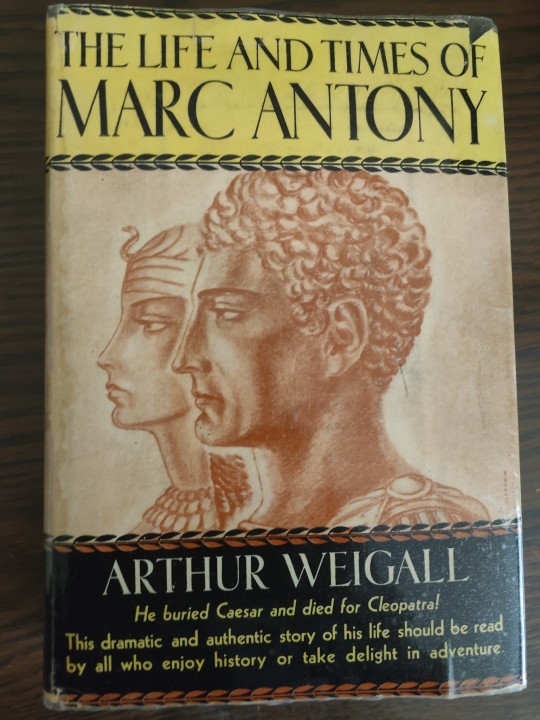
The detailed biography of Marc Antony starts with a good look at the key players of the Late Roman Republic; Gracchi brothers, Marius, Sulla, Pompeius and Caesar. Antony is portrayed with much needed sympathy and as a tragic hero whose love of honour leads to his own tragic, violent end. The author critics Cicero harshly (much needed!), calling him pompous and windbag and an insufferable snob. He gives an exciting account of the personal drama of Antony's life, his early career, conflicts with Augustus and undying love for Cleopatra. Cleopatra is also characterized humanely. Drives into speculation about the possible reason for the disaster at Actium. Absolutely thrilling from start to finish. A must read for all Antonians.
I have the first edition of this remarkable book which was printed almost a hundred years ago!
#mark antony#marc antony#marcus antonius#cleopatra#cleopatra vii#antony and cleopatra#Arthur Weigall#akhenaton#akhenaten#sappho#alexandria#rome#egypt#ancient rome#roman history#roman empire#roman republic#ancient egypt#ptolemaic egypt#ptolemaic dynasty#book review
13 notes
·
View notes
Text
I feel like there are definitely parallels between Missing Link and Rome, especially the late Roman Republic.
Missing Link is set in Scala ad Caelum. That name is Latin, the language of the Roman Republic.
One of the first characters we meet in Missing Link is named Remus. Remus was also the name of one of Rome's mythological founders, along with his twin brother Romulus.
The main conflict in Missing Link (based on what little we know so far) seems to be the tensions between the Society of Hiers (the upper class who claim descent from Ephemer, the legendary founder of Scala) and the Society of Non-Heirs (the lower classes who are not Ephemer's descendants). Part of what led to the collapse of Rome's republican (not the US political party) system of government and transition into a monarchy ruled by an emperor was the growing tensions between the patricians (the upper class) and the plebians (the lower class). The biggest spark of these tensions turning violent were the killings of the Gracchi brothers, who were tribunes of the Plebian Assembly. I won’t get into the exact details, but both were killed in part because they were viewed as threats to the power of the Senate and the patricians because of the reforms they pursued and the way they used the power of the Plebian Assembly. But most importantly, there was little to no violence in Roman politics prior to the deaths of the Gracchi brothers. The killings of the Gracchi brothers introduced the idea of violence as an “acceptable” tool in Roman politics. From there, political violence escalated until things really went to hell with the civil wars between two major political factions: the Optimates (aligned with the Senate and the patricians) and the Populares (aligned with the Plebian Assembly and the plebians). The most important of these civil wars was the one initiated by Sulla, a leader of the Optimates who became the first person in the history of the Republic to seize power by force, declaring himself dictator and abusing the power of the office to purge his political enemies among the Populares. And the precedent of seizing power by force and abusing the office of dictator would later be followed by Julius Caesar. And on Tumblr's favorite holiday, Brutus and Cassius tried to save the Roman Republic from Caesar by turning him into Tumblr's favorite knife receptacle.
Getting back to Missing Link, we know that at some point, Player2 left Scala and raised Baby Xehanort on Destiny Islands. But what we don’t know is WHY Player2 left Scala. Interestingly, after assassinating Caesar, Brutus and Cassius were forced to flee Rome when Caesar's supporters moved to consolidate power. Perhaps this will end up being another parallel?
In conclusion, despite appearing Victorian, the Scala of Missing Link is actually KH Rome. And thus, based on what we know so far, it would make perfect sense for Missing Link to tell the story of how tensions between the Society of Heirs and the Society of Non-Heirs erupts into full fledged civil war in Scala, eventually leading to some guy named Caesar seizing power and declaring himself dictator for life. Player2 will then totally just kill Caesar, only to be forced to flee from Scala and live the rest of their life in exile on Destiny Islands when Caesar's supporters consolidate power.
#khml#kh missing link#khml player#mage's rambling#khml theory#sure let's call it a theory#sounds better than sleep deprived grasping at straws
4 notes
·
View notes